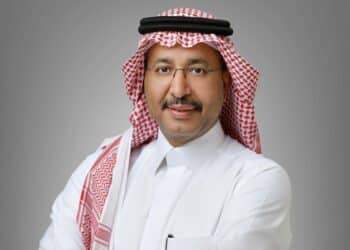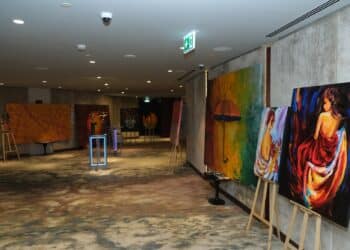Alison Grinnell, the CFO of RAK Hospitality Holding, is convinced that good things are going to be happening in the emirate. She speaks here to Patrick Ryan about how she’s looking forward to seeing how the future unfolds in Ras Al Khaimah.
 It seems that everyone is queuing up these days to tell you about how bad the economy is and how it’s nothing but doom and gloom.
It seems that everyone is queuing up these days to tell you about how bad the economy is and how it’s nothing but doom and gloom.
One person who doesn’t subscribe to that theory is RAK Hospitality Holding CFO Alison Grinnell who has set her sights on ensuring that the Ras Al Khaimah region continues to thrive.
Grinnell said: “The UAE’s economy as a whole is in growth mode and is well diversified, with its tourism sector contributing a significant amount to GDP.
“Within the UAE, Ras Al Khaimah’s hospitality sector has thrived due to the natural beauty of the Emirate and its cost effectiveness.”
She says The Emirate currently has around 3,600 hotel rooms and a lot more in the pipeline to be completed by 2019.
“In light of this data, we see steady growth in the Ras Al Khaimah tourism industry for 2017,” says Grinnell, who then spoke about her own company’s role in the region.
“As an integrated hospitality asset owner and manager, RAK Hospitality Holding (RAKHH) works hand in hand with all stakeholders in Ras Al Khaimah to contribute to the Emirate’s tourism industry.
Grinnell says: “Through our four subsidiaries; RAK National Hotels (RAKNH), RAK Hospitality Asset Management (RAKHAM), RAK Hospitality Logistics (RAKHL) and Hakaya Collection (Hakaya), we aim to cover the entire value chain of the Group, while continuously looking for new opportunities to diversify our portfolio.”
She is buoyant about the deal that subsidiary group RAKNH signed with the Ritz Carlton Hotel Company to operate The Al Wadi Desert, Ras Al Khaimah, referring to it as “the Emirate’s crown jewel”.
Grinnell says another milestone was the Hilton Worldwide agreement to re-open Hilton Ras Al Khaimah as the Hilton Garden Inn Ras Al Khaimah, which will cater to the niche, mid-market segment, which is high in demand in the Emirate.
“This is the kind of expertise that we aim to bring into to Ras Al Khaimah and we plan on maintaining this momentum,” she says.
“These partnerships have strategically diversified our portfolio, as we now cater to all travellers, from the mid-market to the ultra-luxury segments.”
She also mentions how RAK Hospitality Holding is investing in F&B through its operating arm, Hakaya.
“Last year Hakaya entered into a franchise agreement with Kona Grill – an American grill and sushi bar,” she says.
“Under this partnership we plan to develop six Kona Grill restaurants across the UAE in Dubai, Abu Dhabi and Ras Al Khaimah. This is a very exciting deal for us in that it meets the rising demand for premier casual dining.”
One area in which Rak Hospitality Holding is also investing in is re-flagging.
“Re-flagging a hotel is an investment into an existing asset,” she says.
“As an owner, there are several benefits to this. The primary benefit is that an established asset that is already in operation is likely to deliver returns after renovation much faster than a completely new investment.
“Additionally, refurbishment projects take almost half the time than a green-field investment, and starts earning returns much faster. Another big benefit is reduced risk; generally a re-flagging and refurbishment project is associated with less risk than a new project due to its existing brand association and following.”
One property that is currently being re-flagged is the Al Wadi desert resort will officially open as the Ritz Carlton Ras Al Khaimah Al Wadi Desert in Q3 2017.
Grinnell says this decision was taken following a robust selection process with several international bidders.
“As an owner, we normally base our decision as to whether to refurbish or re-flag on a number of factors – where the property is in during its lifecycle (at or beyond its prime), current interest rates, the economic climate, and asset valuation which is based on physical wear and tear and location,” she says.
2017 is a landmark year for RAK Hospitality Holdings as it marks the first year that all of its hotel assets will be fully operational.
“This is following all of our investments in refurbishment and development of our existing portfolio of hotels,” she says.
“The new Hilton Garden Inn due to open in Q2 2017, and the reflagging to The Ritz Carlton in Q3 2017 will provide Ras Al Khaimah with a unique mix of diversity, allowing us to focus on maximising our growth potential in the short to mid-term.”
She speaks candidly about the company finances its projects.
“We finance our projects through a combination of debt and equity. In 2015 we refinanced with an AED880m bank debt to refurbish two hotels and partially fund the purchase of two other hotels,” she says.
“However, we always look at the most appropriate options given our requirements, alignment with our strategy and expectations of our shareholders.”
While Grinnell is confident of Rak Hospitality Holding’s business plan, she says that the market is not without its challenges.
“The hospitality industry is very cyclical in nature and faces several internal and external challenges,” she says.
“New supply that is coming in to the Emirate could be viewed as a challenge, however; at RAK Hospitality Holding we welcome all competition and we consider it healthy for our business.
“If other developers are eyeing the emirate as a destination for their new hotels, it means that Ras Al Khaimah has succeeded in confirming its position on the world map as an attractive hospitality investment destination.”
She adds: “It also means that we must ‘up our game’ to meet the fast-changing traveller preferences which is very exciting for us as at the Group and subsidiary level.
“Finally, some other external challenges that we face are related to geopolitical events and currency fluctuations which impact investment sentiment and spending behaviour of travellers.”



































































